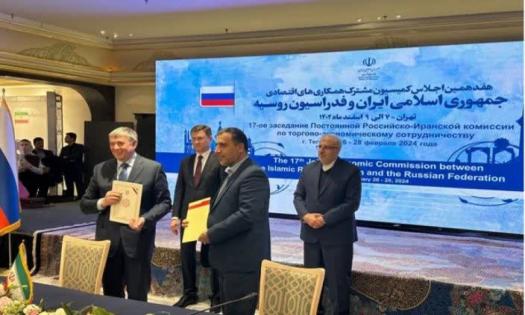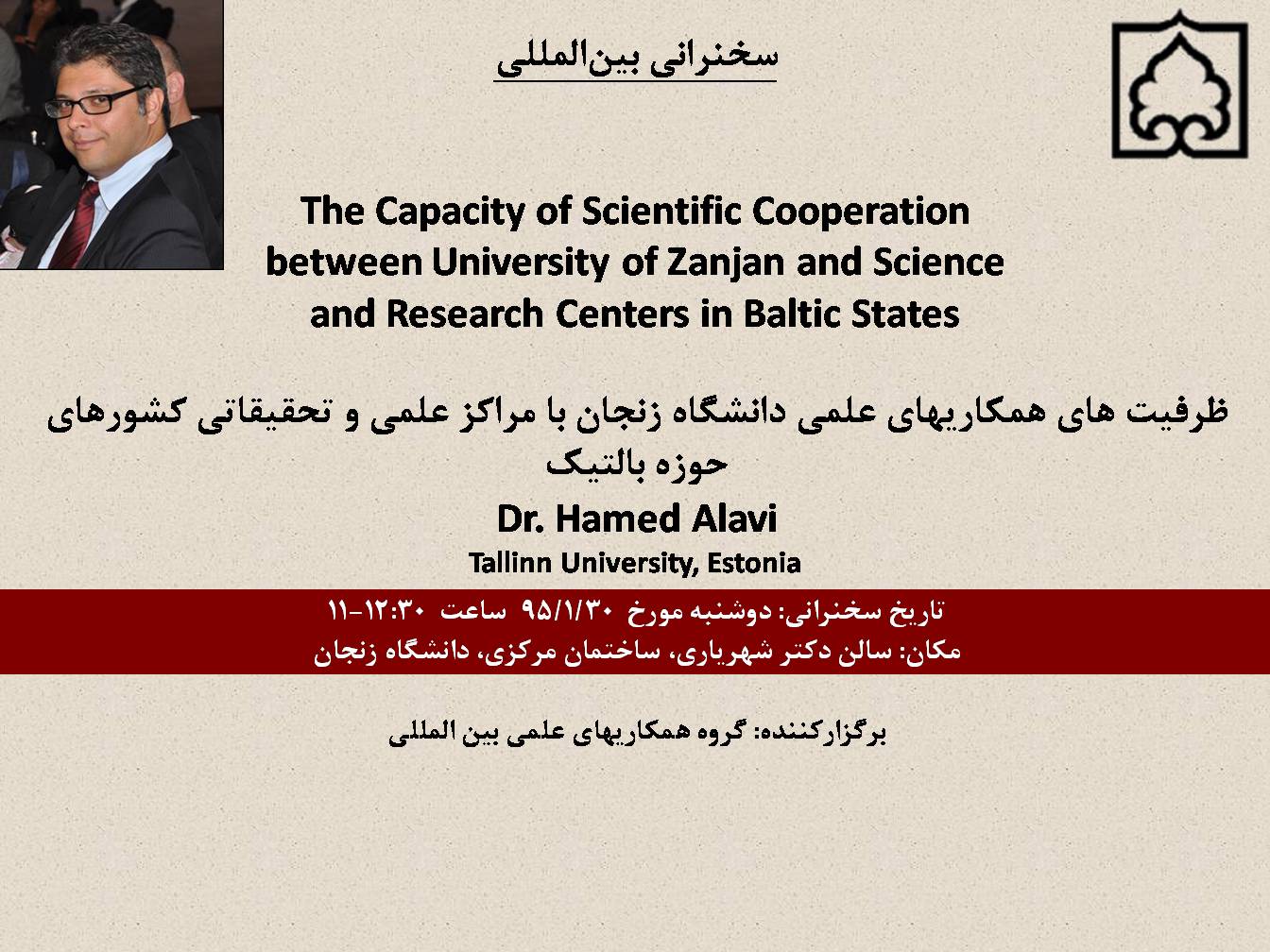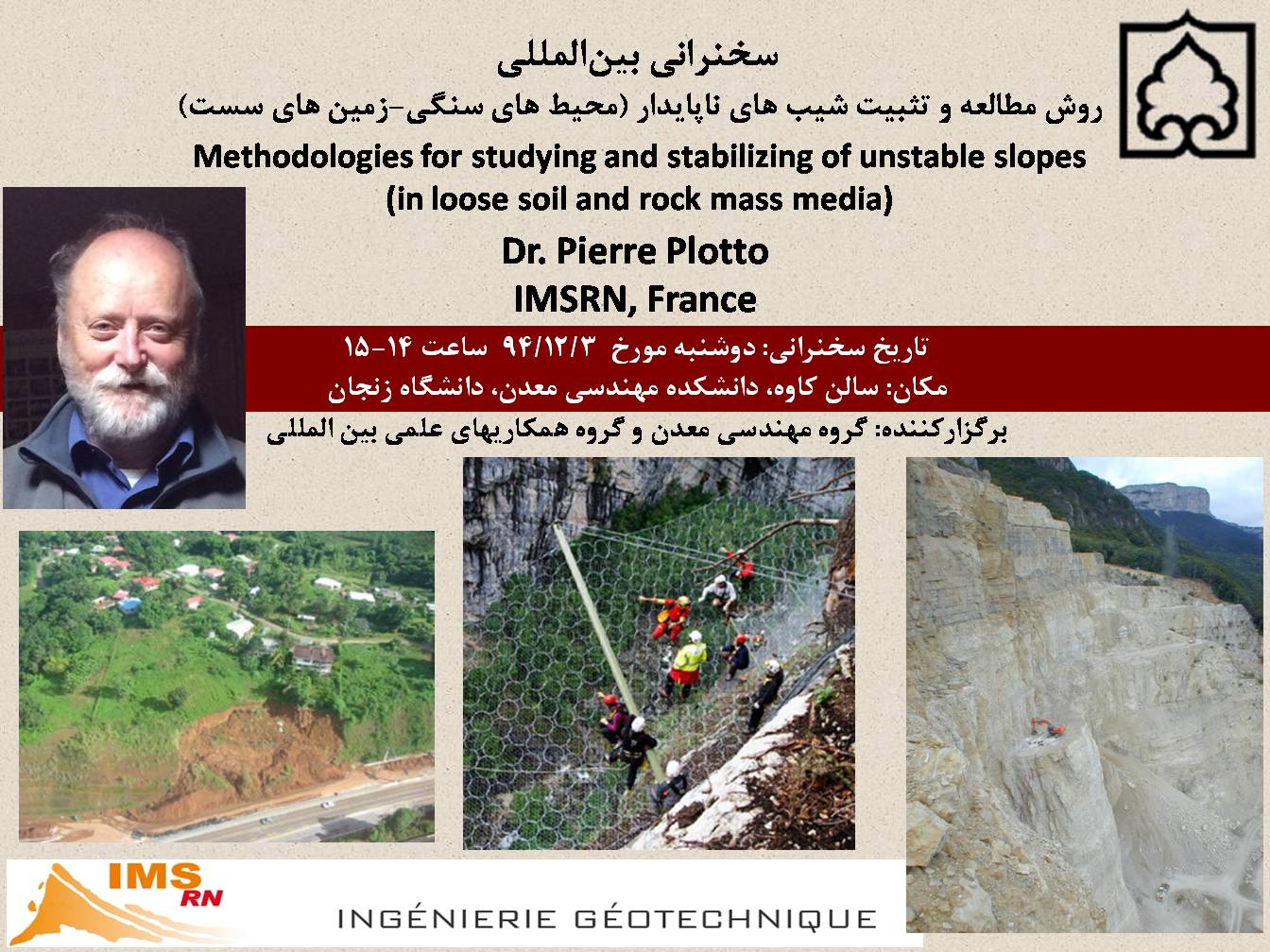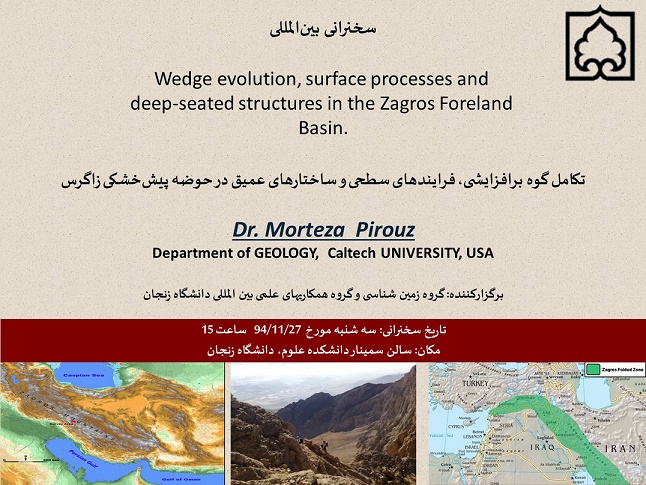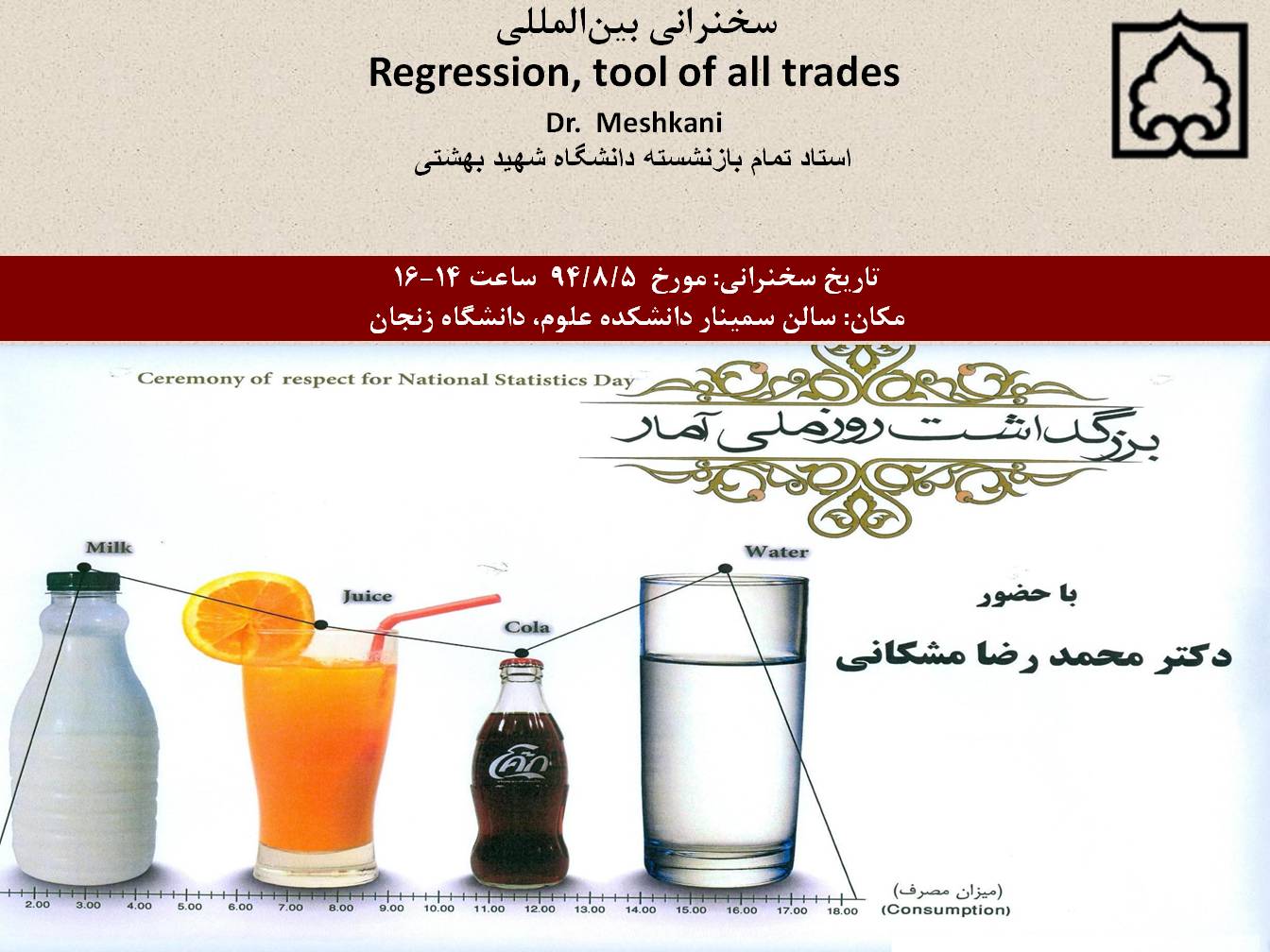
Scientific Lectures and Educational Workshops (Faculty of Science)
| No. | Title | Lecturer | University/ Country | Day | Month | Year |
| 13 | Data Mining and its Application in Business and Indestry | Dr. Nakhaeizadeh | Karlsruhe, Germany | 15 | May | 2016 |
| 12 | Wedge evolution, surface processes and deep-seated structures in the Zagros Foreland Basin | Dr. Morteza Pirouz | Caltech University, USA | 16 | Feb | 2016 |
| 11 | An Introduction to New Animal Biosystematics Methods | Prof. Ersen Aydın Yağmur | Celal Bayar University, Manisa, Turkey | 3-4 | Feb | 2016 |
| 10 | Lecture: Optimization of Capillary Electrophoresis with Imaging Detection for Estimation of Diffusion Coefficients | Dr. Atefeh Sadat Zarabadi | University of Waterloo, Canada | 28 | Dec | 2015 |
| 9 | Effects of the Persian Gulf War on the Environmental Health and Congenital Anomalies | Dr. Mozhgan Savabiesfahani | School of Public Health, University of Michigan | 01 | Nov | 2015 |
| 8 | Stratigraphy and ages of the classic neogene mammal fossil localities from baode county, china | Dr. Anu Kaakinen | University of Helsinki, Finland | 06 | June | 2015 |
| 7 | Mesoproterozoic Supercontinent nuna: in light of paleomagnetic data | Dr. Johanna Salminen | University of Helsinki, Finland | 06 | June | 2015 |
| 6 | Analyzing Natural dyes in Ancient Textiles | Prof. Richard A. Laursen | Boston University, USA | 22 | Apr | 2015 |
| 5 | Modern Analytical Methods in Material and Geo Sciences | Dr. Parvin Sharifi | Max Planck Society, Germany | 03 | Feb | 2015 |
| 4 | Mutual Information Concept and application | Dr. Peter Grasberger | University of Calgary, Canada | 18 | Nov | 2014 |
| 3 |
Lecture: Area dea Estadistica e Investigacion Operativa |
Prof. Jorge Mateu | Jaume I University, Spain | 22-24 | Aug | 2014 |
| 2 | کارگاه عملی گروه زیست شناسی ، تحت عنوان " آشنایی با روش های آزمایشگاهی و فیلدی در بیوسیستماتیک جانوری | Prof. Ersen Aydın Yağmur | Celal Bayar University, Manisa, Turkey | 11-20 | Aug | 2014 |
| 1 | Environmental Impact Assessment | Dr. Amir-Mohammad Yadghar | Concordia University, Canada | 20-21 | Apr | 2014 |
Scientific Lectures and Educational Workshops (Faculty of Agriculture)
| No. | Title | Lecturer | University/ Country | Day | Month | Year |
| 8 | Role of plant viruses in biotechnology | Dr. Afshin Hassani Mehraban | Wageningen University, Netherlands | 09 | Aug | 2015 |
| 7 | Workshop: Next Generation Sequencing (NGS) | Dr. Esmail Ebrahimi |
University of Adelaide, Australia |
2-3 | Mar | 2015 |
| 6 | کارگاه آموزشی بین المللی آنالیز شبکه های ژنی، آنالیز پروموتر و شبکه های تنظیمی و کاربرد داده کاوی در ژنومیکس کاربردی | Dr. Esmail Ebrahimi | University of Adelaide, Australia | 4-5 | Mar | 2015 |
| 5 | Challenges for modeling long – term weed population dynamics | Prof. Jose Luis Gonzalez Andujar | Sustainable Agriculture Research Center and head of the Weed Science Society of Spain | 17 | Nov | 2014 |
| 4 | Global Forum for Rural Advisory Servies (GFRAS)- APIRAS Meeting | GFRAS | GFRAS; Iranian Scientific Society of Agricultural Extension and Education | 03 | Sept | 2014 |
| 3 | Family Farming Meeting | FAO; UNDP; participants | FAO; UNDP; Iranian Scientific Society of Agricultural Extension and Education | 02 | Sept | 2014 |
| 2 | Training Workshop on Women Empowerment for Inclusive Growth and Sustainable Development | Participants: Agricultural Bank; UNDP | Agricultural Bank; UNDP | 31-04 | Aug-Sept | 2014 |
| 1 | “New appoarches for breeding crops with complex Genome” | Prof Adriaan Willem van Heusden, Prof Christoffel Aren Maliepaard, Adriana Margje Griffioen | Wageningen University, Netherlands | 23-25 | June | 2014 |
Scientific Lectures and Educational Workshops (Faculty of Engineering)
| No. | Title | Lecturer | University/ Country | Day | Month | Year |
| 4 | Artificial Intelligence Challenge in Smart Electricity Network | Dr. Sasan Maleki | University of Southampton, England | 04 | May | 2016 |
| 3 | Methodologies for Studying and Stabilizing of Unstable Slopes (In Loose Soil and Rock Mass Media) | Dr. Pierre Plotto | IMSRN, France | 22 | Feb | 2016 |
| 2 | Lecture: Designing and Developing of Big Softwares | Dr. Christian Stillhard |
Zürich Area, Switzerland; Chief Technology Officer of Incentage Corporation |
25 | Nov | 2015 |
| 1 | Networking” and “The Future of Electronics” | Dr. Ehsan Afshari | Cornell University, USA | 16 | Dec | 2014 |
Scientific Lectures and Educational Workshops (Faculty of Humanities)
| No. | Title | Lecturer | University/ Country | Day | Month | Year |
| 1 | Language Curriculum Design and Socialisation | Prof. Peter Mickan | University of Adelaide, Australia | 22 | Nov | 2015 |
| International Lecture: May 15, 2016 |
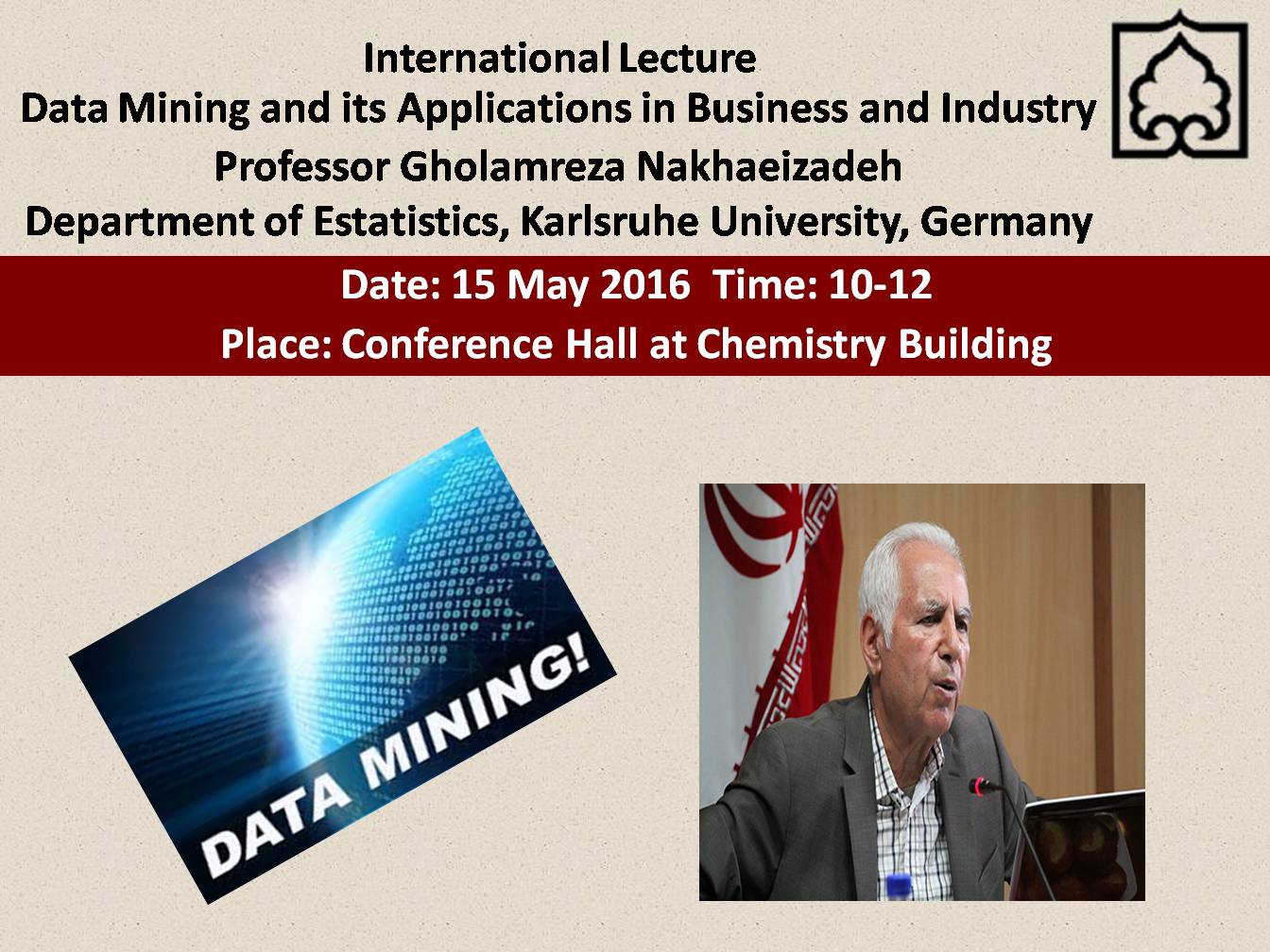
Tiltle: Data Mining and its Application in Business and Indestry.
Lecturer: Dr. Gholamreza Nakhaeizadeh
University/ Country: Karlsruhe University, Germany
Date: May 15, 2016
| International Lecture: May 04, 2016 |
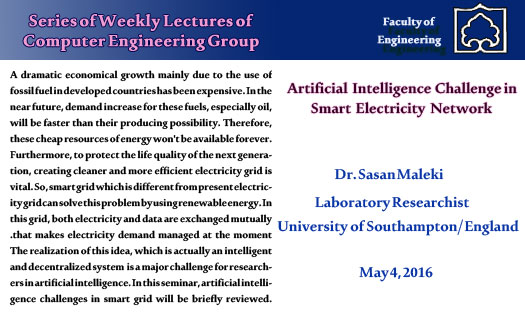
Tiltle: Artificial Intelligence Challenge in Smart Electricity Network.
Lecturer: Dr. Sasan Maleki
University/ Country: University of Southampton, England
Date: May 04, 2016
| International Lecture: April 18, 2016 |
Tiltle: The Capacity Scientific Cooperation between Univercity of Zanjan and Science and Research Centers in Baltic States.
Lecturer: Dr. Hamed Alavi
University/ Country: Tallinn University, Estonia
Date: April 18, 2016
| International Lecture: February 22, 2016 |
Lecturer: Dr. Pierre Plotto
University/ Country: IMSRN, France
Date: February 22, 2016
|
A scientific lecture entitled "Methodologies for Studying and Stabilizing of Unstable Slopes (in loose soil and rock mass media)" by Dr. Pierre Plotto, President at IMSRN from France, was held by the Department of Mining Engineering and International Scientific Cooperation Department on February 22, 2016. At the beginning of the meeting, Dr. Rafiei, head of the Mining Engineering Department, introduced Dr. Plotto and the IMSRN Company. He also highlighted the importance of international communication, especially in order to gain experience alongside academic work. Furthermore, he mentioned the purpose of French company’s presence in the University of Zanjan, which is mostly related to research and developmental collaboration with professors and students of the university. Then Dr. Plotto initiated his lecture on the experiences and practical solutions proposed by the company for different hazards which are created in the environment of unstable soil and rock slopes. Lecture was started with numerous examples of large slips occurred all around the world and the main reasons for occurrence of the events were described one by one. He explained some new ways of measuring and monitoring unstable slopes and also cited the decisive and important role of experience besides the use of new techniques. Meanwhile, new ways were discussed about slopes and the use of scientific software for the relevant calculations. Finally, he was responsive to the questions of teachers and students who were present in the meeting. |
| International Lecture: February 16, 2016 |
Title: Wedge evolution, surface processes and deep-seated structures in the Zagros Foreland Basin
Lecturer: Dr. Morteza Pirouz
University/ Country: Caltech University, USA
Date: February 16, 2016
|
Zagros Basin (part of the Tethys Ocean) have been developed during the Mesozoic. With the closure of Tethys Ocean sedimentary deposits were folded and the withdrawal of water has created the Zagros Mountains. Zagros Basin, due to the enormous hydrocarbon resources (oil and gas) as well as from the perspective of history of geological development of Iran, is very important. Dr. Morteza Pirouz, one of the leading researchers of Caltech University of America, has done extensive studies on the Zagros Basin. Therefore, in order to exchange views among Iran geology enthusiasts and benefit from each other's experiences, Dr. Pirouz was invited to present the findings of his researches in the form of a scientific lecture titled “Wedge evolution, surface processes and deep-seated structures in the Zagros Foreland Basin.” The lecture was held at the University of Zanjan with the participation of professors and students on February 16, 2016. |
| International Lecture: February 3, 2016 |
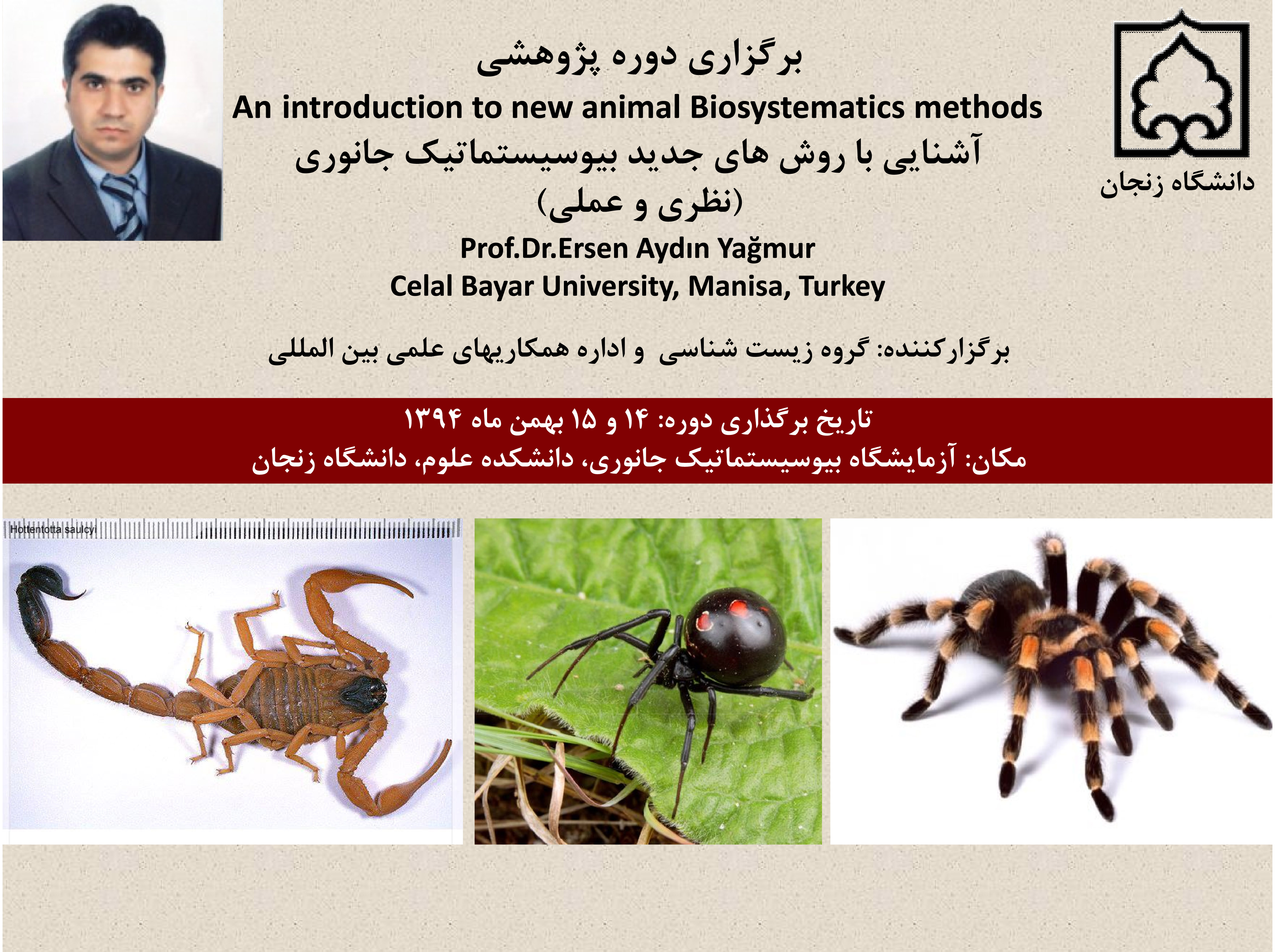
Title: An Introduction to New Animal Biosystematics Methods
Lecturer: Prof. Ersen Aydın Yağmur
University/ Country: Celal Bayar University, Manisa, Turkey
Time: February 3, 2016
|
Report of Professor Ersen Aydın Yağmur’ s research course in Biology Department, Faculty of Science Research workshop entitled “An Introduction to Modern Methods of Animal Biosystematics” was held in the Biosystematic library of biology department in two days with the presence of 16 MSc and BA students of Animal Biosystematics. Dr. Mohammad Moradi, an academic member of Biology Department, invited Professor Ersen Aydın Yağmur who is an academic member of Celal Bayar University in Turkey. First, Dr. Moradi introduced Prof. Yağmur to the students and he also explained main purposes of the course. Then Prof. Yağmur described some generalities about arthropods (trilobite) and diagnostic criteria about their orders, families, genera and species by the help of new methods of Biosystematics. In addition, Prof. Yaghmur taught five new methods of invertebrates’ Biosystematics as theory and practice. Followings are the methods:
|
| Internaional Lecture: December 28, 2015 |
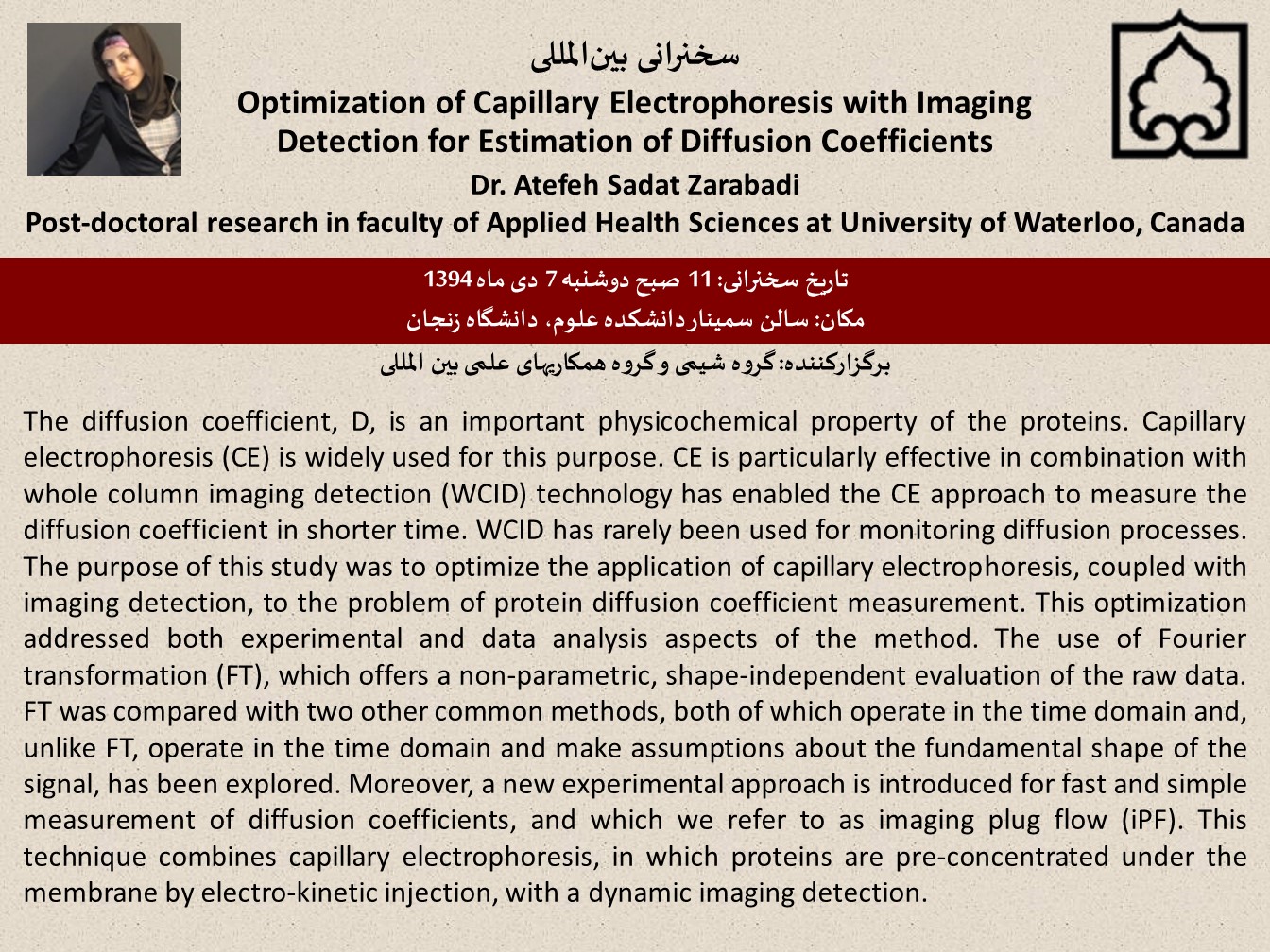
Lecturer: Dr. Atefeh Sadat Zarabadi
University/ Country: University of Waterloo, Canada
Time: December 28, 2015
| Internaional Lecture: December 15, 2015 |
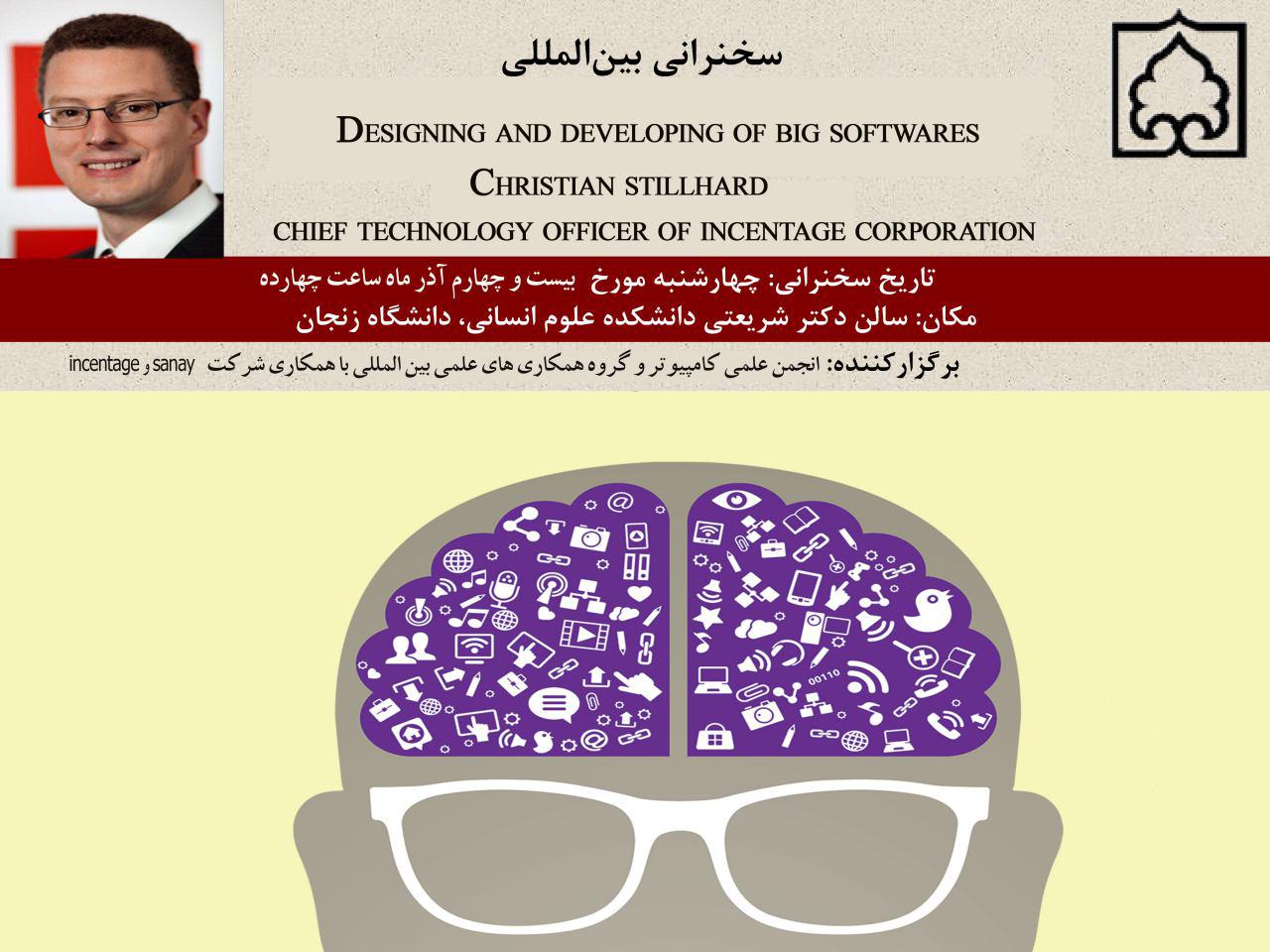
Title: Designing and Developing of Big Softwares
Lecturer: Christian Stillhard
University/ Country: Chief Technology Officer of Incentage Corporation; Zürich Area Switzerland
Time: December 15, 2015
| International Lecture: November 22, 2015 |
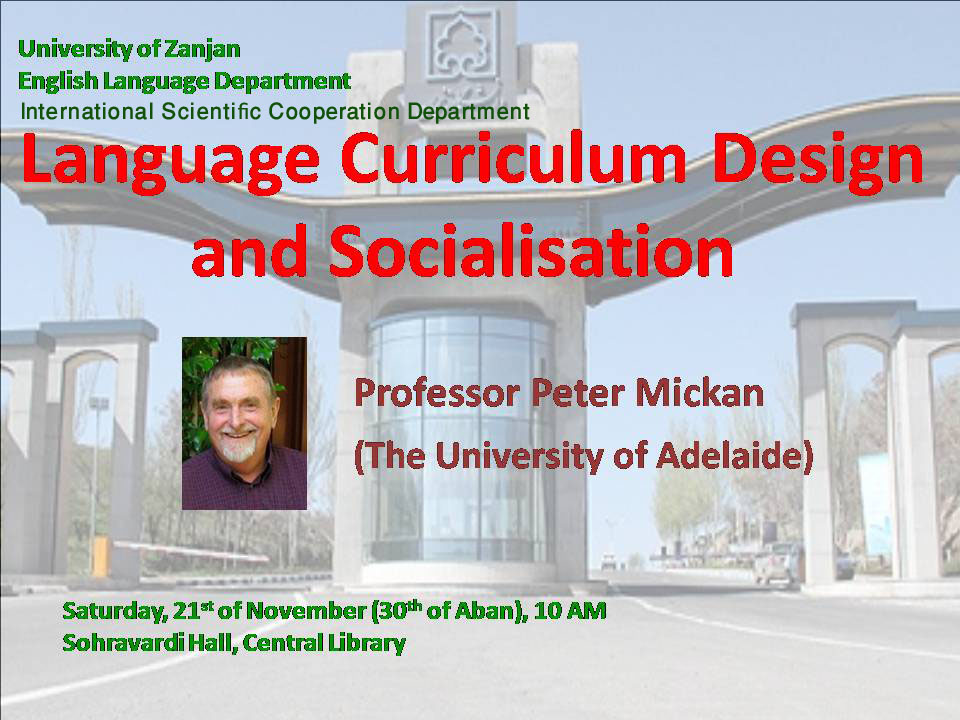
Title: Language Curriculum Design and Socialisation
Lecturer: Professor Peter Mickan
University/ Country: The University of Adelaide, Australia
Date: November 22, 2015
|
Prof. Peter Mickan's Visit to English Department Professor Peter Mickan is Senior Lecturer in the Discipline of Linguistics. He manages the postgraduate Applied Linguistics program at the University of Adelaide. He teaches undergraduate students Language Learning, and postgraduate Applied Linguistics courses in Language and Learning, English for Academic Purposes, and Language Teaching in Specific Settings. Theoretically his work is based on Halliday's language as a social semiotic and learning as socialisation experiences. The theory frames his studies in curriculum design, in languages pedagogy, in academic literacies, in language and literacy, in workplace communication, and in language assessment. On November 21, Prof. Mickan from the University of Adelaide, Australia, attended a meeting at the Faculty of Humanities. Members of the English Department had discussions with the professor about bilateral academic cooperations, as well as research topics of mutual interest. The meeting was held at the Dean's office. The following day, November 22, Prof. Mickan presented a lecture on Language Curriculum Design and Socialization, followed by questions and answers. The speech was directed to B.A and M.A students of English language. At the end of the session, the head of English Department expressed her gratitude, and a handicraft made in Zanjan was given as a sign of appreciation from the university's side. |
| International Lecture: November 1, 2015 |
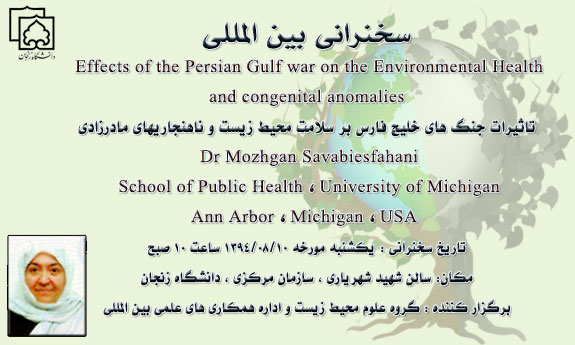
Title: Effects of the Persian Gulf War on the Environmental Health and Congenital Anomalies
Lecturer: Dr. Mozhgan Savabiesfahani
University/ Country: School of Public Health, University of Michigan, USA
Date: November 1, 2015
|
The abstract of Dr. Savabieasfahani’s lecture: Dr. Mozhgan Savabieasfahani is the winner of Rachel Carson Prize for 2015. She is the author of more than 30 peer reviewed articles and a book entitled "Pollution and Reproductive Damage: Pollution induced cell-death and reproductive damage in fish and mammals" (2009). She is an environmental toxicologist, based in Ann Arbor, Michigan. U.S. Wars in the Middle East turned her attention to war-related pollutants and their effects on civilians. Her early research included studies of endocrine disrupting compounds and petrochemical contaminants. She has published repeatedly on the effects of war pollutants on Iraqi civilians. She has documented increases in birth defects and neurodevelopmental disorders in three Iraqi cities Basra, Fallujah, and Hawija. She believes U.S. government and other agencies responsible for creating war pollution in Iraq and Afghanistan must be held accountable for the damage they have caused to civilians and the environment in these countries. Dr. Savabieasfahani says: "The United States has only recently started clean up of some of its bases in Vietnam. Many U.S bases in Vietnam are severely contaminated with dioxins. Exposure to dioxins has caused birth defects and cancers in Vietnam for 40 years. Certainly the U.S. should be held responsible to clean up its bases globally. In Iraq, clean up of U.S. bases will reduce public exposure to neurotoxic compounds and reduce the catastrophic damage inflicted upon Iraq's newborns, which is already reminiscent of that in Vietnam. Why wait for decades? Cleanup now and save millions of people from years of devastation and pain". Environmental Sciences Department |
| International Lecture: October 28, 2015 |
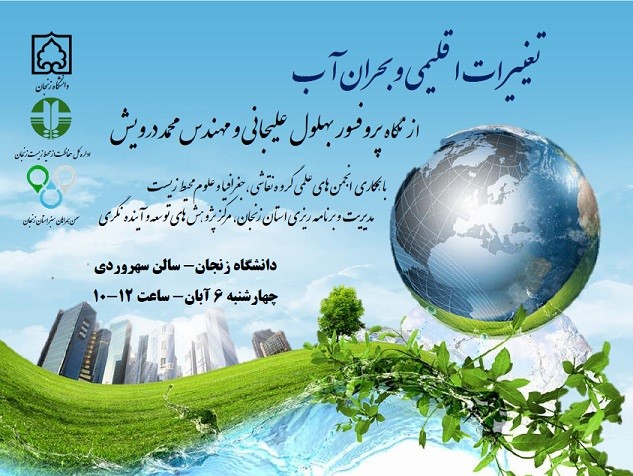
Title: Climate Change and Water Crisis in Iran
Lecturers: Prof. Bohlol Alijani & Mr. Mohammad Darvish
Date: October 28, 2015
|
Professor Bohlol Alijani Kharazmi University, Tehran Nearly all regions of the world are expected to experience a net negative impact of climate change on water resources and freshwater ecosystems. The intensity and characteristics of the impact, however, can vary significantly from region to region. Some regions are likely to experience water shortages. Coupled with increasing demand, this is likely to result in large increases in the number of people at risk of water scarcity. Rising sea levels may threaten the lives and livelihood of millions of people. The frequency of floods and droughts are certain to increase in much of the world. The economic cost is likely to be high and the overall crop yield may decline, increasing the risk of poverty and hunger. For a long-term strategic planning of a country's water resources in the face of the evolving climate change impacts, it is important that these effects be quantified with a high spatial and temporal resolution. This may be the most beneficial application of hydro climatology to support long-term water resources management and planning. An integrated hydrological simulation model could help to study the net effect of climate change in a given region. The results of investigations on the impact of climate change on water resources in Iran for the near future will be presented and discussed here. We specifically look at the changes in various components of the water balance including precipitation and evapotranspiration distribution, river discharge, soil moisture, and aquifer recharge, considering Iran's large climate variability from north to south. The change impacts on water resources and provide information to support future water resources planning and management in Iran. |
| International Lecture: October 27, 2015 |
Title: Regression, Tool of all Trades
Lecturer: Dr. Mohammadreza Meshkani
Date: October 27, 2015
